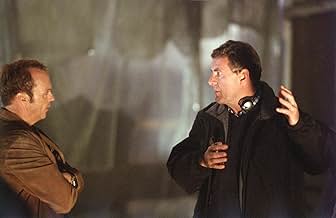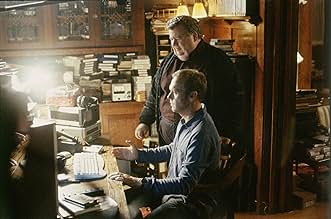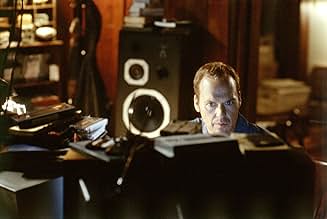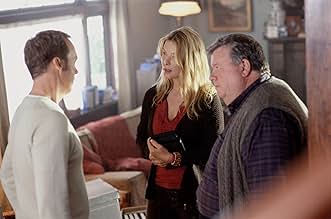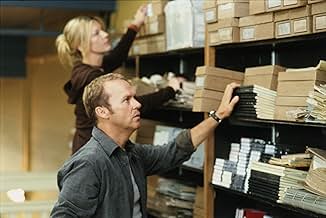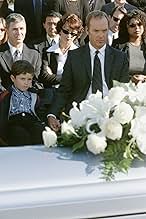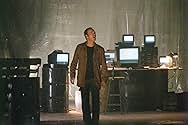NOTE IMDb
5,5/10
52 k
MA NOTE
Le désir d'un architecte de pouvoir parler à sa femme par-delà la tombe devient une obsession aux répercussions surnaturelles.Le désir d'un architecte de pouvoir parler à sa femme par-delà la tombe devient une obsession aux répercussions surnaturelles.Le désir d'un architecte de pouvoir parler à sa femme par-delà la tombe devient une obsession aux répercussions surnaturelles.
- Réalisation
- Scénario
- Casting principal
- Récompenses
- 1 victoire et 2 nominations au total
Avis à la une
White Noise is a film that takes a true scientific phenomenon, and makes a film out of it. The phenomenon is one which involves electronic recording/broadcast equipment. In amongst white-noise (that crackle and hiss you get on a blank recording) and static on untuned TV reception there are voices and images discernible. Sometimes these voices have been clear enough to work out, and many people believe they are the voices and images of those who have died, trying to contact the living.
In the film, Michael Keaton plays Jonathan Rivers, an estate agent who loses his wife. When he is approached by Raymond, a man who lost his son years ago and claims he has heard from Jonathan's wife, it draws him into the phenomenon, and pretty soon he becomes obsessed, recording his own tapes and viewing/listening to them for messages. Then, suddenly, the messages become clear, and seem to be premonitions. Can he decipher the meaning of the messages, or will he disturb something best left alone? I was uncertain going into the film what to expect. Too many times the film world have come up with a great concept, but failed to deliver anything more than mediocre when it is a horror subject. Expecting another Godsend, I was pleasantly surprised to find a pretty good film, with some nice touches, and chills. Admittedly the story wouldn't look out of place on X-Files, but unlike the recent The Forgotten, it manages to feel complete, and doesn't seem to take the easy option at the end.
The direction by Sax (best know for his TV work such as Tipping the Velvet, Dr Who, Clocking Off, and Spitting Image to name a few) is more than sufficient, and he uses the white-noise to great effect. A little buzz here, and flicker there all serve to unnerve, and you could be forgiven for thinking you are watching another Japanese adaptation. There are a lot of similarities to eastern horror throughout, the use of silence the unnerve, the distorted images in the TV sets, and so on. Only the occasion "music to let you know you should jump" lets down the tone.
Nevertheless, with a well woven script which doesn't pander to the lowest denominator, and a sterling performance from Michael Keaton, who hasn't really had a presence on the screen since 1998s Jack Frost, make this an enjoyable little movie which deserves a viewing or two.
In the film, Michael Keaton plays Jonathan Rivers, an estate agent who loses his wife. When he is approached by Raymond, a man who lost his son years ago and claims he has heard from Jonathan's wife, it draws him into the phenomenon, and pretty soon he becomes obsessed, recording his own tapes and viewing/listening to them for messages. Then, suddenly, the messages become clear, and seem to be premonitions. Can he decipher the meaning of the messages, or will he disturb something best left alone? I was uncertain going into the film what to expect. Too many times the film world have come up with a great concept, but failed to deliver anything more than mediocre when it is a horror subject. Expecting another Godsend, I was pleasantly surprised to find a pretty good film, with some nice touches, and chills. Admittedly the story wouldn't look out of place on X-Files, but unlike the recent The Forgotten, it manages to feel complete, and doesn't seem to take the easy option at the end.
The direction by Sax (best know for his TV work such as Tipping the Velvet, Dr Who, Clocking Off, and Spitting Image to name a few) is more than sufficient, and he uses the white-noise to great effect. A little buzz here, and flicker there all serve to unnerve, and you could be forgiven for thinking you are watching another Japanese adaptation. There are a lot of similarities to eastern horror throughout, the use of silence the unnerve, the distorted images in the TV sets, and so on. Only the occasion "music to let you know you should jump" lets down the tone.
Nevertheless, with a well woven script which doesn't pander to the lowest denominator, and a sterling performance from Michael Keaton, who hasn't really had a presence on the screen since 1998s Jack Frost, make this an enjoyable little movie which deserves a viewing or two.
Michael Keaton gives a good performance as architect Jonathan Rivers. I found the movie good and thrilling at times but it somehow lost its phase in the end. But then again that's also the case with many films like Timecop and Hard Cash.
Storywise the movie was quite good. The idea of a device which can record our personalities after death is quite interesting. A quote by Thomas Edison made in 1928, which is used in the beginning of the movie, states: "Nobody knows whether our personalities pass on to another existence or sphere, but if we can evolve an instrument so delicate as to be manipulated by our personality as it survives in the next life such an instrument ought to record something." The concept of E.V.P.; (Electronic Voice Phenomenon) is elaborated on through the entire movie and it leaves us still thinking.
The directing and the way it's written holds up pretty good up until about 2/3 in the movie. The characters and Michael's acting as a father is quite good and not flawed in any way. The story flows in a good and convincing way. But it's in the end where it starts to get a little hectic. There's a twist to the story which sorta destroys the original set up and it becomes a tad....well dull and inconsistent to be perfectly blunt.
But all in all this is an enjoyable film. Just don't expect to be blown away.
Storywise the movie was quite good. The idea of a device which can record our personalities after death is quite interesting. A quote by Thomas Edison made in 1928, which is used in the beginning of the movie, states: "Nobody knows whether our personalities pass on to another existence or sphere, but if we can evolve an instrument so delicate as to be manipulated by our personality as it survives in the next life such an instrument ought to record something." The concept of E.V.P.; (Electronic Voice Phenomenon) is elaborated on through the entire movie and it leaves us still thinking.
The directing and the way it's written holds up pretty good up until about 2/3 in the movie. The characters and Michael's acting as a father is quite good and not flawed in any way. The story flows in a good and convincing way. But it's in the end where it starts to get a little hectic. There's a twist to the story which sorta destroys the original set up and it becomes a tad....well dull and inconsistent to be perfectly blunt.
But all in all this is an enjoyable film. Just don't expect to be blown away.
Interesting. Intense. Somewhat original. All words to describe a conversation with Johnny Betts. But they also apply to Michael Keaton's White Noise. What we have here is a ghost story that tackles the subject of electronic voice phenomenon, or, as the cool kids like to call it - EVP.
For those of you who, unlike Johnny Betts, aren't master ghost hunters, EVP is the alleged communication by spirits through the white noise of staticky radio stations, television stations, and other electronic devices. People truly believe in it, and if you do a quick search on the Internet then you can find plenty of websites with audio files they say prove the existence of EVP. Detractors will brush this off with explanations of the "chaos theory" and cross modulation. I'll let you do your own research if you're interested in the subject.
If you're looking for a factual exploration of EVP's possible legitimacy, then you won't find it in White Noise. This is a movie that takes a subject popular with ghost hunters and glorifies it. It reminds me a little of The Mothman Prophecies, which was a fictionalized account of what was supposed to be a "true story." I have no problem with that. That's what movies are all about.
Michael Keaton crawls out from underneath whatever rock he's been under, does his best "Bruce Willis in The Sixth Sense" impersonation, and dives into the world of receiving messages from the dead. Folks, you can nitpick the logic to death if you want, and trust me, most critics are. "Why would he just put his successful life on hold and spend all his time trying to receive messages from his wife through a bunch of radio and TV static?" Dunno. The tragic death of a spouse can do weird things to people. Plus, you know, IT'S A MOVIE! And in the movie, he actually does receive messages from the dead. I guess he figured he'd try it; it worked, so he got more involved. Lighten up. It's called fiction.
"Yeah, well, if his wife wanted to contact him, then why wouldn't she send him clearer messages? Why does it have to be through static?" BECAUSE THAT'S WHAT EVP IS ALL ABOUT! Take it up with the proponents of EVP, not the movie. I totally agree that one of the things that makes so many people skeptical about EVP is that the messages are never complex. If I heard an EVP that said, "Tell Johnny Betts that the afterlife rules, and he should keep the Movie Mark going strong," then I'd probably be convinced. But what we get is a lot of one syllable words and sounds strung together. That's not the movie's fault. Deal with it and move on.
As some of you know, I'm a huge fan of the thriller/horror genre. Admittedly, White Noise isn't one of the best of all time in the genre, but that's OK. It didn't convince me to run home, record a static TV channel for hours, and then play it back to see if Uncle Jack was sending me a message from the great beyond. Like an apology for that little streaking stunt that completely ruined my 16th birthday party. However, what the movie did do is entertain me. The mystery is deliberately paced, it kept my interest, and it provided some creepy moments along the way.
Things start to get pretty intense near the end of the movie, and some people might not be happy with the finale. But keep in mind that trying to communicate with the dead is a bit of a dark subject. Some people, as the movie depicts, think that if they can contact their dead relatives then they'll have hope, they'll know all is right in the afterlife. They want some sort of message for closure. But I'm just curious, what if that message is, "Burning. Hell. I screwed up." ??? I'm guessing that'd be a bit of a kick in the pants.
But getting back to the movie... if there's good in the afterlife, there has to be evil as well, right? In the movie, contacting the dead initially seems harmless enough. But why would you think only the good would respond if you create that human/afterlife portal? What would happen if evil decided to communicate as well? White Noise has a viewpoint on that subject, and you can't expect everything to be cute and cuddly.
Now if you'll excuse me, I'm gonna take a closer listen to this static coming from the radio. Let's see. Sounds like Uncle Jack! I can just make it out... "Johnny. Reviews. Not funny. Quit. Now." Um, yeah, just as I thought - nothing but a little cross modulation! THE GIST White Noise is an interesting take on the ghost story, using the subject of EVP as its backdrop. It isn't what I'd call scary, but it's got its share of creepy moments and effective jump scenes. If you're looking for a docu-drama on the scientific accuracy of EVP then you might be disappointed, but if you're in the mood for a few chills to start the year then White Noise just might suit you.
Rating: 4 (out of 5)
For those of you who, unlike Johnny Betts, aren't master ghost hunters, EVP is the alleged communication by spirits through the white noise of staticky radio stations, television stations, and other electronic devices. People truly believe in it, and if you do a quick search on the Internet then you can find plenty of websites with audio files they say prove the existence of EVP. Detractors will brush this off with explanations of the "chaos theory" and cross modulation. I'll let you do your own research if you're interested in the subject.
If you're looking for a factual exploration of EVP's possible legitimacy, then you won't find it in White Noise. This is a movie that takes a subject popular with ghost hunters and glorifies it. It reminds me a little of The Mothman Prophecies, which was a fictionalized account of what was supposed to be a "true story." I have no problem with that. That's what movies are all about.
Michael Keaton crawls out from underneath whatever rock he's been under, does his best "Bruce Willis in The Sixth Sense" impersonation, and dives into the world of receiving messages from the dead. Folks, you can nitpick the logic to death if you want, and trust me, most critics are. "Why would he just put his successful life on hold and spend all his time trying to receive messages from his wife through a bunch of radio and TV static?" Dunno. The tragic death of a spouse can do weird things to people. Plus, you know, IT'S A MOVIE! And in the movie, he actually does receive messages from the dead. I guess he figured he'd try it; it worked, so he got more involved. Lighten up. It's called fiction.
"Yeah, well, if his wife wanted to contact him, then why wouldn't she send him clearer messages? Why does it have to be through static?" BECAUSE THAT'S WHAT EVP IS ALL ABOUT! Take it up with the proponents of EVP, not the movie. I totally agree that one of the things that makes so many people skeptical about EVP is that the messages are never complex. If I heard an EVP that said, "Tell Johnny Betts that the afterlife rules, and he should keep the Movie Mark going strong," then I'd probably be convinced. But what we get is a lot of one syllable words and sounds strung together. That's not the movie's fault. Deal with it and move on.
As some of you know, I'm a huge fan of the thriller/horror genre. Admittedly, White Noise isn't one of the best of all time in the genre, but that's OK. It didn't convince me to run home, record a static TV channel for hours, and then play it back to see if Uncle Jack was sending me a message from the great beyond. Like an apology for that little streaking stunt that completely ruined my 16th birthday party. However, what the movie did do is entertain me. The mystery is deliberately paced, it kept my interest, and it provided some creepy moments along the way.
Things start to get pretty intense near the end of the movie, and some people might not be happy with the finale. But keep in mind that trying to communicate with the dead is a bit of a dark subject. Some people, as the movie depicts, think that if they can contact their dead relatives then they'll have hope, they'll know all is right in the afterlife. They want some sort of message for closure. But I'm just curious, what if that message is, "Burning. Hell. I screwed up." ??? I'm guessing that'd be a bit of a kick in the pants.
But getting back to the movie... if there's good in the afterlife, there has to be evil as well, right? In the movie, contacting the dead initially seems harmless enough. But why would you think only the good would respond if you create that human/afterlife portal? What would happen if evil decided to communicate as well? White Noise has a viewpoint on that subject, and you can't expect everything to be cute and cuddly.
Now if you'll excuse me, I'm gonna take a closer listen to this static coming from the radio. Let's see. Sounds like Uncle Jack! I can just make it out... "Johnny. Reviews. Not funny. Quit. Now." Um, yeah, just as I thought - nothing but a little cross modulation! THE GIST White Noise is an interesting take on the ghost story, using the subject of EVP as its backdrop. It isn't what I'd call scary, but it's got its share of creepy moments and effective jump scenes. If you're looking for a docu-drama on the scientific accuracy of EVP then you might be disappointed, but if you're in the mood for a few chills to start the year then White Noise just might suit you.
Rating: 4 (out of 5)
Jonathan Rivers (Michael Keaton) is a successful architect. His wife, Anna (Chandra West) is an even more successful novelist. When Anna goes missing one night, they fear she is dead. Suddenly, an odd man named Raymond Price (Ian McNeice) shows up and tells Jonathan that his wife has been trying to contact him from "the other side", via Electronic Voice Phenomena (EVPs). Rivers also gradually gets wrapped up in EVPs, which lead him to some unusual situations and the heart of a mystery.
I had a very divided reaction to White Noise. Some aspects were excellent, but in many ways, the film had potential that was never actualized. There are also some flaws that kept drawing me out of the film's universe. Overall I felt the film worked, but probably not as writer Niall Johnson and director Geoffrey Sax intended.
Let's talk about what the film did right first. The major assets, as mentioned in the title of my review, were the production/set design, cinematography and overall atmosphere. The latter largely hinges on the first two. The production/set design and cinematography were nearly perfect. Everything was focused on the idea of white noise, especially the most well known visual depiction of white noise--television "static" or "snow". The credits introduced a motif of jarring intrusions of white noise, which occasionally recurred throughout the film (although perhaps not enough). There were clever instantiations of a visual "white noise" theme in the sets, such as the outside waterfall on the lower level of Jonathan's apartment building, and the wall of glass blocks inside his apartment. The color scheme was white, silver and blue, washed out so that the film had an almost black and white feel. There were also more abstract references to white noise, such as the running water motif (water dynamics are mathematically chaotic, as is white noise, which is also thought of as being literally random), and the arcing electricity. All of this combined to provide a wonderful, gloomy atmosphere, and in another film, would easily compensate for any minor flaws to bring the film up to a 10.
However, there are a number of problems with White Noise. Keaton's performance was the major sticking point for me. He seems aloof and brooding throughout the entire film. While that may have been perfect for Batman, it doesn't work for me here. Both McNeice and Deborah Kara Unger (as Sarah Tate) were fine, but their roles were minor enough to not be able to carry the film. I usually like Keaton a lot, and I can't say that I dislike him here, but his performance is very odd and off-putting.
Another problem was the pacing. For a long time, White Noise may as well have been a realist drama. While that's fine for other films, it also doesn't tend to work in a horror/thriller. The only directors I've seen really able to pull that combination off effectively are Alfred Hitchcock and M. Night Shyamalan. It takes so long to get to the horror/thriller part of the story that many people likely either lose interest by that point, or they're interested because they'd rather see a realist drama, and the more supernatural ending will be unsatisfying for them. The pacing also doesn't fit with the white noise/chaos motif. This is a film that should have been edited like a Michael Bay vehicle.
Finally, I had a number of problems with the story. One, there are quite a few superfluous elements (such as Jonathan's son). Two, although I'm not someone who usually complains about genre combinations, there was an attempt to make White Noise both a "benevolent spirit" story, ala Ghost (1990) and a Ring (2002)-like otherworldly threat. The two just didn't meld. Three, the thriller aspect, which enters primarily at the climax of the film, seems too tacked on to engender an appropriate emotional reaction from the audience. And four, the supernatural aspects and especially the "twist revelation" of the ending are very rushed and unpleasantly ambiguous, possibly in an attempt to hide the fact that the plot in these respects wasn't very well thought out. There is a tremendous amount of potential in the script, and it is entertaining enough to marginally recommend, but this seems more like an early draft that was rushed to completion, or possibly a film that suffered a lot of studio meddling.
The bottom line is that while there are enough positive elements to make White Noise worth a watch to serious genre fans and students of film-making, do not expect the story to grab you by the short and curlies, and do not expect much of a resolution. Enjoy the film primarily for its visuals. I'm generously rating the film a 7 out of 10.
I had a very divided reaction to White Noise. Some aspects were excellent, but in many ways, the film had potential that was never actualized. There are also some flaws that kept drawing me out of the film's universe. Overall I felt the film worked, but probably not as writer Niall Johnson and director Geoffrey Sax intended.
Let's talk about what the film did right first. The major assets, as mentioned in the title of my review, were the production/set design, cinematography and overall atmosphere. The latter largely hinges on the first two. The production/set design and cinematography were nearly perfect. Everything was focused on the idea of white noise, especially the most well known visual depiction of white noise--television "static" or "snow". The credits introduced a motif of jarring intrusions of white noise, which occasionally recurred throughout the film (although perhaps not enough). There were clever instantiations of a visual "white noise" theme in the sets, such as the outside waterfall on the lower level of Jonathan's apartment building, and the wall of glass blocks inside his apartment. The color scheme was white, silver and blue, washed out so that the film had an almost black and white feel. There were also more abstract references to white noise, such as the running water motif (water dynamics are mathematically chaotic, as is white noise, which is also thought of as being literally random), and the arcing electricity. All of this combined to provide a wonderful, gloomy atmosphere, and in another film, would easily compensate for any minor flaws to bring the film up to a 10.
However, there are a number of problems with White Noise. Keaton's performance was the major sticking point for me. He seems aloof and brooding throughout the entire film. While that may have been perfect for Batman, it doesn't work for me here. Both McNeice and Deborah Kara Unger (as Sarah Tate) were fine, but their roles were minor enough to not be able to carry the film. I usually like Keaton a lot, and I can't say that I dislike him here, but his performance is very odd and off-putting.
Another problem was the pacing. For a long time, White Noise may as well have been a realist drama. While that's fine for other films, it also doesn't tend to work in a horror/thriller. The only directors I've seen really able to pull that combination off effectively are Alfred Hitchcock and M. Night Shyamalan. It takes so long to get to the horror/thriller part of the story that many people likely either lose interest by that point, or they're interested because they'd rather see a realist drama, and the more supernatural ending will be unsatisfying for them. The pacing also doesn't fit with the white noise/chaos motif. This is a film that should have been edited like a Michael Bay vehicle.
Finally, I had a number of problems with the story. One, there are quite a few superfluous elements (such as Jonathan's son). Two, although I'm not someone who usually complains about genre combinations, there was an attempt to make White Noise both a "benevolent spirit" story, ala Ghost (1990) and a Ring (2002)-like otherworldly threat. The two just didn't meld. Three, the thriller aspect, which enters primarily at the climax of the film, seems too tacked on to engender an appropriate emotional reaction from the audience. And four, the supernatural aspects and especially the "twist revelation" of the ending are very rushed and unpleasantly ambiguous, possibly in an attempt to hide the fact that the plot in these respects wasn't very well thought out. There is a tremendous amount of potential in the script, and it is entertaining enough to marginally recommend, but this seems more like an early draft that was rushed to completion, or possibly a film that suffered a lot of studio meddling.
The bottom line is that while there are enough positive elements to make White Noise worth a watch to serious genre fans and students of film-making, do not expect the story to grab you by the short and curlies, and do not expect much of a resolution. Enjoy the film primarily for its visuals. I'm generously rating the film a 7 out of 10.
Successful architect Jonathan Rivers (Michael Keaton) is overjoyed when his wife Anna (Chandra West) reveals her pregnancy. Then she disappears. Jonathan confronts Raymond Price (Ian McNeice) who's been following him. Raymond who lost his son tells him about Electronic Voice Phenomenon and that he has received messages from Anna. Her body is found having drowned. Six months later, Jonathan moves into an apartment and strange electronic things continue. He becomes convinced about EVP. He goes to Raymond who is now helping Sarah Tate (Deborah Kara Unger) with her lost fiancé. As he obsessively decipher the electronic signals, he encounters menacing spirits and even those who are not dead quite yet.
Michael Keaton is past his early successes and is yet to gain his resurgent accolades. It's a time period when he was a has-been doing limited work. If nothing else, this movie's success shows that he can still be the lead. I really like the cold static moody atmosphere. I don't think the son is necessary but it's where the story goes that leaves me a bit cold. The spirits are a disappointment. The near-death messages idea is where the movie goes down the wrong path. The moody ghost story turns into a muddled thriller. The spirits' climatic battle is a mess. This movie starts good but ends poorly.
Michael Keaton is past his early successes and is yet to gain his resurgent accolades. It's a time period when he was a has-been doing limited work. If nothing else, this movie's success shows that he can still be the lead. I really like the cold static moody atmosphere. I don't think the son is necessary but it's where the story goes that leaves me a bit cold. The spirits are a disappointment. The near-death messages idea is where the movie goes down the wrong path. The moody ghost story turns into a muddled thriller. The spirits' climatic battle is a mess. This movie starts good but ends poorly.
Le saviez-vous
- AnecdotesThe EVP recording from the trailer ("I will see you no more") that is attributed to a woman named Ruth Baxter, who died in 1987, is supposedly a recording from Point Lookout, a "haunted" lighthouse in Maryland, made by an EVP researcher named Sarah Estep. The lighthouse was used as a hospital during the Civil War, and some interpretations of the recording believe it to say, "I was seeing the war", or "I was seeing the water". While the recording is said to be authentic by the AAEVP, the Ruth Baxter story is fictional.
- GaffesThough the story is set in Washington, the filmmakers make no attempt to conceal British Columbia licence plates.
- Citations
Raymond Price: [after John hears a ghost cursing at them] There are some very bad people out there. They can't all be Anna.
- Crédits fousThe opening of the film starts with: "Nobody knows whether our personalities pass on to another existence or sphere, but if we can evolve an instrument so delicate to be manipulated by our personality as it survives in the next life such an instrument ought to record something..." Thomas Edison 1928 E.V.P.; (Electronic Voice Phenomenon) The recording of voices and images of the dead, using de-tuned receiving apparatus. Identified in 1939, and now the subject of increasing scientific research worldwide, to finally evidence communication with the deceased.
- ConnexionsFeatured in WatchMojo: Top 10 Movies That Will Make You Paranoid (2015)
- Bandes originalesBurn Away
Written and Performed by Ray O'Donnell, Liam Carty and Fran Carlyon
Meilleurs choix
Connectez-vous pour évaluer et suivre la liste de favoris afin de recevoir des recommandations personnalisées
- How long is White Noise?Alimenté par Alexa
Détails
Box-office
- Budget
- 10 000 000 $US (estimé)
- Montant brut aux États-Unis et au Canada
- 56 386 759 $US
- Week-end de sortie aux États-Unis et au Canada
- 24 113 565 $US
- 9 janv. 2005
- Montant brut mondial
- 91 196 419 $US
- Durée1 heure 41 minutes
- Couleur
- Mixage
- Rapport de forme
- 2.35 : 1
Contribuer à cette page
Suggérer une modification ou ajouter du contenu manquant

Lacune principale
By what name was La voix des morts (2005) officially released in India in English?
Répondre

